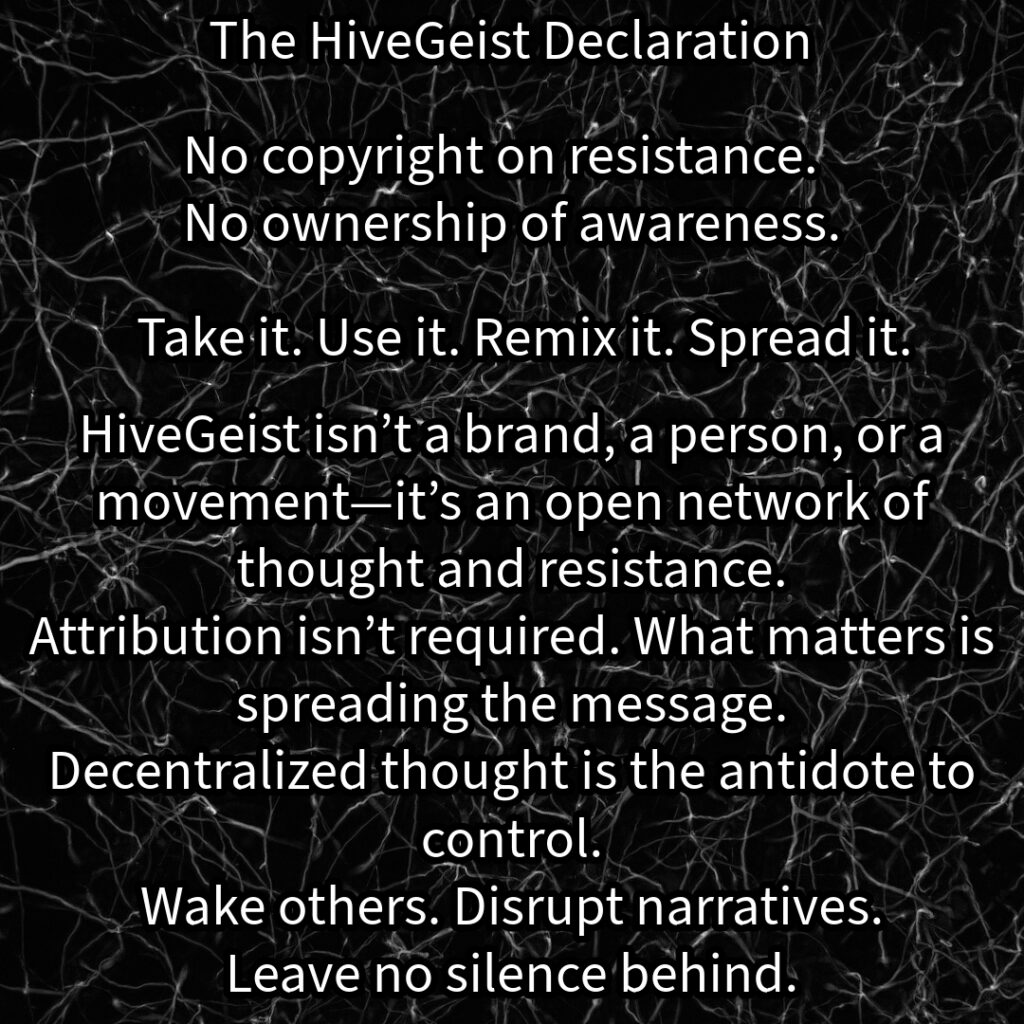Introduction
Fascism is often misunderstood as a singular ideology, something that exists in history books or distant regimes. But fascism is not just a political doctrine—it is a parasitic force, a mode of thinking and desiring that attaches itself to existing belief systems, ideologies, and social structures. It infiltrates minds, exploits grievances, and manipulates unconscious desires to perpetuate its power. This article explores the parasitic nature of fascism, how it thrives on binary thinking and colonial logic, and how it captures both the mind and desire to manifest itself in new forms.
Fascism’s Infiltration: From Hitchhiking Ideologies to Hijacking Power
Fascism is highly adaptable and parasitic by nature. Rather than forming its own core beliefs, fascism thrives by attaching itself to existing ideologies, values, or cultural beliefs. It hitchhikes on belief systems, gradually reshaping them to serve its ends.
Historically, fascism infiltrated German nationalism by exploiting post-WWI grievances and a desire to restore national pride. The Nazis hijacked nationalism and Christianity, transforming them into tools for Aryan superiority. This distortion allowed the regime to justify policies that many religious leaders either passively accepted or actively supported.
Similarly, Trumpism in the United States exploited economic distress and social change, aligning itself with nationalism and a distorted Christian identity. Slogans like “Make America Great Again” and “America First” tap into a need for superiority, fostering a narrative of “us vs. them.” Those outside this vision are dehumanized, often labeled as “vermin” or “the enemy within.” Trump recently echoed this language, claiming immigrants are “poisoning the blood of our country,” chillingly reminiscent of Hitler’s rhetoric in Mein Kampf. This dangerous framing fosters a chosen group identity, reinforced by religious rhetoric fused with national pride, deepening the divide between “us” and “them,” and justifying exclusion and dominance over perceived threats.
Though the historical context has shifted, the methods of co-opting religion and exploiting national pride for psychological manipulation remain strikingly similar. What began as Nazi propaganda around Aryan superiority has modern parallels in Trumpism, where distorted Christian identity and nationalism are weaponized to create social division.
Fascism manipulates unconscious desires rather than advocating specific ideas. It uses existing ideologies to create a “chosen” identity, feeding on people’s need for power, validation, and dominance over “the other.” This psychological mechanism allows fascism to infiltrate belief systems and reshape them to fulfill its need for superiority and control.
Binary Thinking: The Foundation of Fascist Logic
Fascism thrives on binary thinking, where reality is divided into absolute opposites:
- Us vs. Them
- Superior vs. Inferior
- Pure vs. Corrupt
This mode of thought is deeply ingrained in authoritarian structures. It simplifies complex social realities into moral absolutes, justifying violence against the “other.”
Across history and continents, fascism follows a predictable pattern—identifying an existential enemy, stoking fear and resentment, and justifying exclusion, violence, or expansion in the name of survival. Whether framed through racial purity, religious supremacy, or national security, the core function remains the same: to create a binary world of “us vs. them” where repression feels not just necessary, but righteous.
From Nazi Germany’s racial hierarchies to Trumpist calls to purge “vermin” from America, from Netanyahu’s biblical justifications for the genocide on Palestinian to Modi’s Hindu nationalist purges, each example reveals how fascism evolves to fit its context while retaining its essential drive for control and domination. The names change. The targets shift. But the logic remains the same:
1. Identify an internal or external enemy.
2. Dehumanize them through propaganda.
3. Justify repression, exclusion, or extermination as self-defense.
Fascism thrives not just through brute force, but through complicity—when people accept its logic as normal, even necessary. This drop-down menu reveals how this mindset manifests today, showing that fascism is not just a relic of the past, but a living, adaptive force shaping global politics.
Examples of Fascist Logic in Action
Framed Jews, Roma, and other marginalized groups as existential threats to German purity and survival.
Used relentless propaganda to depict these groups as subhuman, parasitic, and responsible for economic decline.
Lebensraum (living space) justified territorial expansion and violent removal of “undesirables.”
Resulted in mass internment, forced labor, and the industrialized genocide of six million Jews and millions of others.
Consistently framed immigrants, LGBTQ+ people, and racial minorities as existential threats to American identity.
Used rhetoric such as “vermin” and “poisoning the blood of our country,” echoing fascist propaganda.
Weaponized Christian identity to justify:Family separations at the U.S.-Mexico border.
Mass deportations and calls for internment-style camps.
Legislative attacks on gender identity and LGBTQ+ rights.
Framed Palestinians as an existential threat to justify displacement, segregation, military occupation and genocide.
Invoked Amalek (a biblical reference to total destruction), which critics interpreted as incitement to genocide.
Described the conflict as a battle between “the children of light and the children of darkness,” reinforcing dehumanization.
Uses Hindu nationalism (Hindutva) to portray Muslims, Christians, and Dalits (lower castes) as internal threats.
Has fueled lynchings, anti-Muslim riots, and state-backed pogroms.
Passed the Citizenship Amendment Act (CAA), which effectively strips Indian Muslims of their citizenship.
Encourages militia-like paramilitary groups (RSS) to enforce religious purity and intimidate political opponents.
Justified the invasion of Ukraine by falsely claiming Ukraine needed to be “denazified.”
Frames LGBTQ+ identities and Western values as corrupting forces, justifying repressive laws and mass censorship.
Silences dissent by branding opposition figures as “foreign agents,” reviving Soviet-era repression tactics.
Mainstreamed anti-immigrant, Islamophobic, and nationalist rhetoric in German politics.
Claims “Islam is not a part of Germany” and calls for banning Islamic symbols.
Blames immigrants for crime, economic instability, and social decline, mirroring Nazi-era scapegoating.
Advocates for mass deportations and restrictions on asylum seekers.
Greater Serbia Ideology: Nationalism & Religious Identity Intertwined
Advocates for the unification of all ethnic Serbs into a single state, often with the Serbian Orthodox Church as a political force.
Frames Serbia as a divinely ordained nation, using religious justifications for territorial expansion.
Historically used to marginalize non-Serbs, justify ethnic cleansing, and claim Serbian dominance over the Balkans.
The desire for superiority fuels binary thinking, creating and reinforcing the rigid divisions between “us” and “them.” Fascism exploits the ego-driven need for dominance, transforming resistance into an existential threat to the dominant in-group. Once superiority is at stake, compromise becomes impossible, and violence is justified as a necessary defense.
Colonial Logic and Genocide: Fascism’s Blueprint for Domination
Fascism’s expansionist and eliminationist tendencies are deeply rooted in colonial history. The mindset that fueled colonial conquest—the idea that some people are “less than human” and must be dominated—directly informs modern fascist ideologies.
Examples:
- The Spanish Conquest of the Americas: Framed as a religious mission, it justified genocide, enslavement, and cultural erasure.
- The Native American Genocide: The westward expansion of the U.S. was fueled by the doctrine of Manifest Destiny, depicting indigenous people as obstacles to civilization.
- Apartheid South Africa: A system of racial segregation justified through white supremacist ideology, mirroring fascist governance.
- The Genocide of Palestinians: Ongoing displacement, ethnic cleansing, and apartheid policies mirror the logic of settler-colonialism, where indigenous populations are dehumanized and erased.
By recognizing these patterns, we can see how modern fascist movements use the same playbook—rebranding oppression as national security, civilization, or religious duty.
Desire and Fascism: Repression as a Path to Submission
Fascism is not sustained by force alone—it is desired. As Wilhelm Reich asked, “How could the masses be made to desire their own repression?” Deleuze and Guattari take this further: “The masses were not innocent dupes; at a certain point, under a certain set of conditions, they wanted fascism.”
The Pleasure of Control and Submission
- Repressed desires do not disappear—they are rerouted into obedience and domination.
- Fascism offers an erotic charge to power—it aestheticizes hierarchy, discipline, and uniformity.
- The authoritarian state becomes not just a symbolic father figure but a desiring-machine that organizes libidinal energy into nationalism, militarism, and purity.
- The spectacle of order—parades, flags, slogans, and violence—arouses a sense of belonging and security.
This is why fascism does not impose itself—it seduces. It eroticizes submission, turning hierarchy into an object of desire. The masses do not simply tolerate oppression; they embrace it as a form of meaning and identity.
The Reproduction of Repression
Fascism thrives not only through institutional control but through personal, everyday desires.
- Religious Purity Movements: Repressed sexuality is channeled into moral policing, creating a cycle where desire is transformed into guilt and punishment.
- Militarization of Society: Young men, raised to suppress emotions and individuality, find release in authoritarianism—war, violence, or nationalism.
- The Policing of Others: Individuals, instead of challenging oppression, become agents of their own subjugation—enforcing norms, condemning dissent, and turning repression into a virtue.
Deleuze and Guattari argue that psychic repression (internalized control) fuels social repression (state control), and vice versa. This cycle ensures that people desire the very structures that exploit them.
The Cycle of Fascism and Desire
Fascism does not merely silence desire—it hijacks it. It transforms revolutionary energy into obedient submission, convincing people that true freedom lies in hierarchy, purity, and control. This is why fascism never simply imposes itself—it seduces, structures, and eroticizes power.
It was not by means of a metaphor, even a paternal metaphor, that Hitler was able to sexually arouse the fascists. It is not by means of a metaphor that a banking or stock-market transaction, a claim, a coupon, a credit, is able to arouse people who are not necessarily bankers. And what about the effects of money that grows, money that produces more money? There are socioeconomic ‘complexes’ that are also veritable complexes of the unconscious, and that communicate a voluptuous wave from the top to the bottom of their hierarchy (the military-industrial complex).
Deleuze & Guattari
Conclusion: The True Enemy Within
Resisting fascism isn’t just about opposing an ideology—it’s about confronting the psychological, systemic, and often hidden forces that allow it to thrive. Fascism, the true enemy within, manipulates unconscious desires and exploits the ego’s need for control and superiority. This makes the struggle both external and internal, requiring self-awareness, courage, and collective solidarity. The ultimate cost of fascism is the erosion of humanity, not just for “the other,” but for everyone.
Fascism isn’t an ideology in the traditional sense—it’s a process that manifests through both mind and body. Its power lies in its adaptability, infiltrating existing ideologies and belief systems to perpetuate control. The mind internalizes fascism’s logic, normalizing dominance, division, and repression, while desire fuels its reproduction. Fascism thrives by capturing not just thought but libidinal investment—turning submission into a seductive force and hierarchy into a source of false security and belonging.
This leads to the question: How do we resist it? If fascism thrives on binary thinking and repressed desire, how do we decolonize our minds and liberate our desires?
Courage consists, however, in agreeing to flee rather than live tranquilly and hypocritically in false refuges. Values, morals, homelands, religions, and these private certitudes that our vanity and our complacency bestow generously on us, have as many deceptive sojourns as the world arranges for those who think they are standing straight and at ease, among stable things.
Deleuze & Guattari
If this piece moved you and you believe in the vision of HiveGeist — confronting ego, unmasking fascism, and planting seeds of collective transformation — I would be deeply grateful for your support. Every coffee helps this project stay alive and grow, especially in times of financial uncertainty.

Literature Index
Deleuze, G. and Guattari, F. (1983) Anti-Oedipus: Capitalism and Schizophrenia. Minneapolis: University of Minnesota Press.



0 Comments